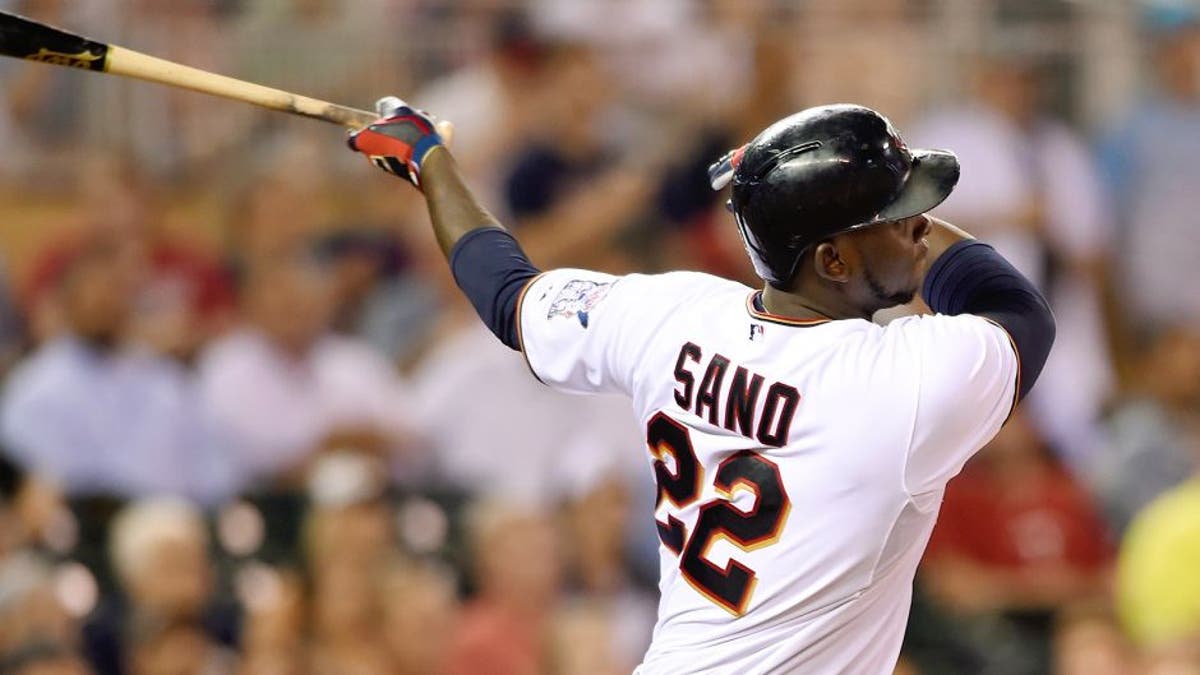
MINNEAPOLIS, MN - SEPTEMBER 1: Miguel Sano #22 of the Minnesota Twins hits a solo home run against the Chicago White Sox during the seventh inning of the game on September 1, 2015 at Target Field in Minneapolis, Minnesota. The Twins defeated the White Sox 8-6. (Photo by Hannah Foslien/Getty Images)
(We will preview one team's offseason each day leading up to the start of free agency. Now up: the Minnesota Twins.)
Minnesota ended the season with an 83-79 record, good enough for second place in the American League Central but 12 games behind the first-place Kansas City Royals. The Twins finished above the .500 mark for the first time in five years and were in the hunt for a wild-card spot until the final weekend of the season.
With a roster of young talent, sprinkled with some veteran leadership, the Twins rose from bottom-feeders to legitimate contenders in the division under the watch of first-year manager Paul Molitor.
The Twins fell short of a full-on revival, thanks mostly to their lack of viable options for the front end of the rotation and untimely injuries to their young stars. But they're not far from relevancy, and they could get there if they address these three things this offseason:
1. Spend some money to get a legitimate ace. The Twins are the epitome of a "small-market team" with a limited payroll, so any money they spend in free agency must be spent wisely. Unfortunately, that hasn't been the case in Minnesota, as GM Terry Ryan recently signed pitchers Ricky Nolasco and Ervin Santana to hefty free-agent contracts that just haven't panned out.
With so much money tied up in bad contracts, it's hard to see ownership giving Ryan the go-ahead to spend more money on a first- or second-tier free-agent starter. This year's free-agent class is loaded with big-name pitchers like David Price, Zack Greinke and Jordan Zimmermann, who will all command top dollar from free spending teams. But the Twins are a team that's more apt to dedicate a big chunk of its payroll to "B-level" guys like Mike Leake, Scott Kazmir and Doug Fister.
The Twins are on the cusp of being perennial contenders, but ownership will have to spend a lot of cash for an ace if it wants to get over the hump.
2. Convince Torii Hunter to stick around for one more year. From the outside, Hunter seems like just another 40-year-old player whose better days are behind him. But to the Twins, Hunter is the glue that holds the team together and the impact he has on the young players is immeasurable.
"He was a good influence on this entire organization," Ryan said of Hunter in his end-of-season press conference. It's obvious that the Twins wouldn't hesitate to put Hunter back in right field, if he chooses not to retire.
"All the question marks about Torii and sabermetrics, I think we answered those this year," Ryan said. "I think he was more than an adequate right fielder."
Hunter hit .240 in 139 games and ranked second on the team with 81 RBI. His 22 homers were tied with Trevor Plouffe for second behind Brian Dozier's 28. That's definitely "more than adequate."
If Hunter opts to hang it up, however, it will be in the best interest of the Twins to find a veteran presence to replace him.
3. Let the kids loose. The keys to success for small-market teams are good drafting, developing homegrown talent and hitting on international signings -- and the Twins have done all three. But Ryan has a history of trading young talent before it has the chance to flourish in the organization. Minnesota's farm system is loaded with promising prospects like Max Kepler, Byron Buxton and Jose Berrios -- along with budding major-league stars like Miguel Sano, Trevor May and Eddie Rosario. These kids are the future of the organization and now is their time to thrive. Ryan should take a note from Cubs' president Theo Epstein and unleash the youth movement -- and stick with them.
